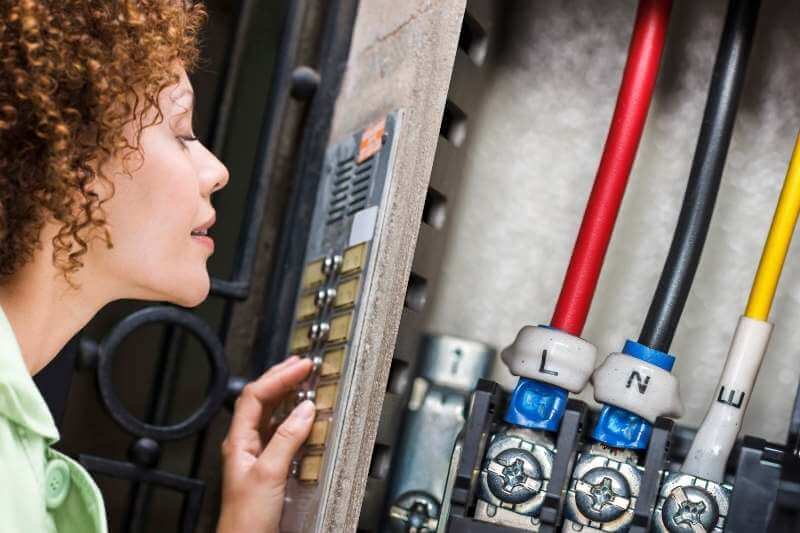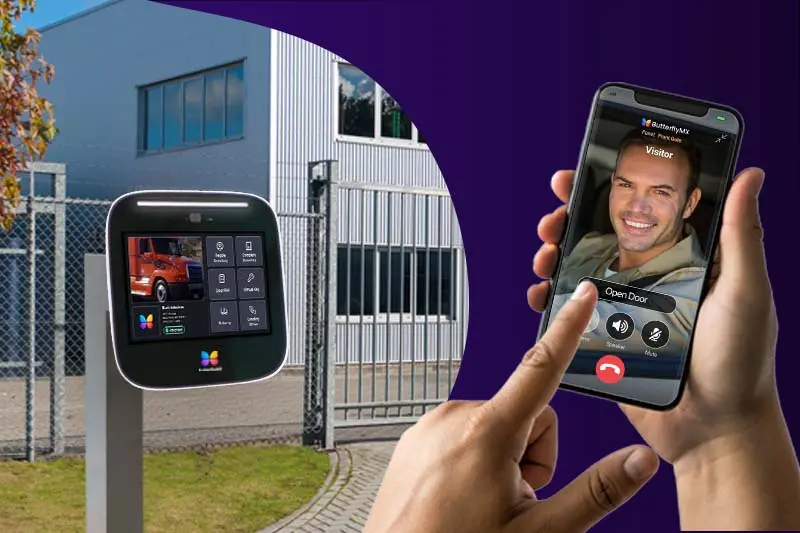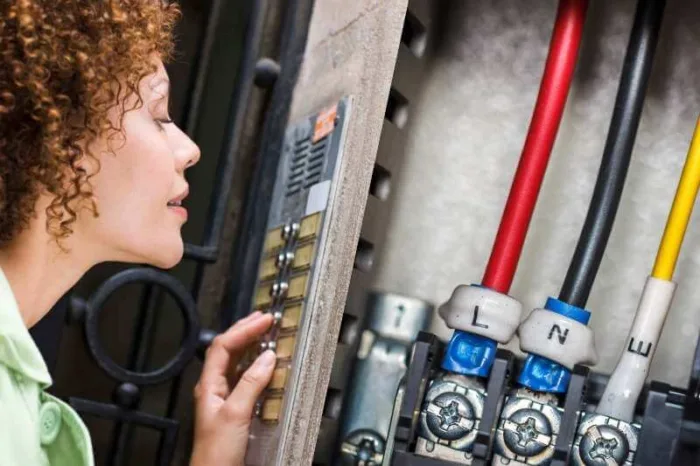Key takeaways
- Wireless commercial intercom systems enable communication and property access without extensive wiring, reducing installation costs and complexity.
- These systems allow tenants to manage access remotely via smartphones, enhancing convenience and security.
- Wireless intercoms are ideal for retrofitting existing buildings, as they minimize disruption and are compatible with various property types.

Intercom systems are the easiest way to enable property access for deliveries and visitors at commercial buildings. Whether you already have a commercial intercom system but need to upgrade it, or you’re looking to install a new intercom, you have an important choice to make: Should you get a wired or a wireless commercial intercom system?
If you’re unsure which system to choose, read on to learn about the differences between wired and wireless commercial intercoms and which one is best. We’ll also discuss hardware requirements and costs associated with wireless intercom systems for buildings.
This post covers:
- What is a wireless commercial intercom system
- How a commercial wireless intercom works
- The difference between a wired and wireless commercial intercom system
- Why a wireless commercial intercom is better than a wired intercom
- Wireless commercial intercom systems without in-unit hardware
- Wireless commercial intercom cost
What is a wireless commercial intercom system?
A wireless commercial intercom enables people inside a commercial building to communicate with visitors outside the building and grant them property access using devices that are connected wirelessly.
Wireless commercial intercoms are designed for commercial properties, like office buildings and industrial facilities. They consist of a base station installed at the building’s entrance and substations installed throughout the building. The connection between the base station and each substation is completely wireless.

Every base station and substation in a two-way wireless intercom system has a microphone and a speaker so that visitors and tenants can hear and talk to each other. Some intercoms — known as commercial video intercom systems — even have a built-in camera for video calling.
How does a wireless commercial intercom work?
When a visitor arrives at a commercial building with a wireless intercom, they use the intercom base station to alert the tenant they’re visiting. The visitor selects a tenant from the intercom directory and calls them, which prompts the base station to send a signal to the correct substation. Inside the building, the tenant uses an intercom substation to answer the call and grant or deny access.
So how do the base station and substations speak with each other if they’re not physically connected? Through radio frequencies called spectrum. Wireless commercial intercoms use low-frequency bands (portions of spectrum) to transmit signals.
What’s the difference between a wired and wireless commercial intercom system?
The difference between a wired and wireless commercial intercom system is the type of connection between the base station (at the entrance) and each substation (within the building).
- A wireless commercial intercom does not require wiring between the base station and each substation.
- A wired commercial intercom does require wiring between the base station and each substation.
An important note: Every commercial intercom system requires wiring — even intercoms that are technically “wireless.” However, some intercoms require more wiring than others. At a minimum, every commercial intercom needs wiring for power and the door lock. But there are two other types of wiring that may be required depending on the type of system you choose: internet wiring and hardware wiring
Watch how ButterflyMX works:
Internet wiring and hardware wiring
While a wireless commercial intercom only requires wiring to power the system and connect it to the door lock, there are two other types of wiring you must consider when purchasing a commercial intercom.
The two important types of intercom wiring:
Internet wiring
Modern multi-tenant commercial intercoms require an internet connection for features like video calling and remote management.
If your intercom needs an internet connection, you have two options:
- A hardwired internet connection with an ethernet cable
- A wireless internet connection (WiFi or a cellular connection like 4/5G)
Wireless internet connections may seem more convenient, but they actually pose some significant problems. Wireless internet connections are less stable and reliable than wired ones. WiFi signals risk interruption from electrical interference and provider outages, while cellular connections often require a commercial-grade plan with a high-bandwidth connection. In contrast, wired internet connections reduce your risk of connectivity issues.
Pro tip: Connect your wireless commercial intercom to the internet with a Cat 5/6 ethernet cable to maximize security, reduce interference from other devices and signals, and ensure reliability.
Hardware wiring
Commercial intercom systems require two pieces of hardware: a base station and substations. Hardware wiring refers to the wired connection between those two devices.
Wired commercial intercoms require you to run wiring from the base station at the entrance to every substation within your building. Wireless commercial intercom systems don’t require physical wiring between hardware. Instead, the intercom hardware communicates digitally between base and substations.

Pro tip: Hardware wiring between base stations and substations is difficult and expensive to install — especially if your base station is far from each substation. Choose a commercial door entry system without hardware wiring to significantly reduce the cost of your installation.
Why wireless commercial intercom systems are better than wired intercoms
If your commercial building needs an intercom, choose a wireless commercial intercom system. Intercoms without hardware wiring offer benefits for property managers, developers, owners, and installers.
The benefits of a wireless commercial intercom system include:
- Faster and simpler installation. Going wireless means your installer won’t have to cut walls open or break them down to run the intercom wiring throughout your property. Instead, they’ll only have to install the hardware.
- More affordable. It costs less to install a wireless commercial intercom because the installation is far simpler.
- Easier repairs and maintenance. If any portion of the wiring in a wired intercom is damaged, you could have a costly repair on your hands.
- Simple to upgrade. If you upgrade your commercial intercom in the future, you won’t have to rewire your entire building.
Pro tip: When purchasing a wireless commercial intercom for a business, choose one with a wired internet connection. A wired internet connection offers stability, reliability, and security.
Wireless intercom systems without in-unit hardware
If you’re ready to purchase a wireless intercom, there’s still one more factor to consider: the in-unit hardware.
You know that intercom systems require a base station for visitor use and substations for tenant use. But did you know that some wireless commercial intercom systems allow tenants to use smartphones as substations? That means you can replace in-unit hardware with devices your tenants already have and use every day.

Here’s why you should choose a wireless commercial intercom without in-unit hardware:
- In-unit hardware is expensive. Not only do you have to purchase a device for every unit in your building, but you also have to pay someone to install all that hardware. Between the hardware prices and the installation cost, you’re looking at a hefty bill.
- Installing hardware in every unit takes a long time. A longer installation means greater disruptions to your tenants and their employees.
- In-unit hardware requires maintenance and repairs. Every piece of hardware is prone to occasional malfunction. If you install hardware in every unit, you’ll have to spend a lot of time and money maintaining those devices.
- Tenants prefer using their smartphones. Wireless commercial intercom systems are desirable office amenities that deliver the convenient experience your tenants crave. When your intercom connects to tenants’ smartphones, they have more power and freedom to manage property access on the go and grant access even if they’re not in the building. Wireless intercoms are
Pro tip: Choose an intercom that offers smartphone-based access with a reliable mobile app. Check the app’s ratings in the Apple App Store and Google Play store to see what current users have to say about it. Avoid an intercom system if its app is buggy or unreliable.
How much does a wireless commercial intercom system cost?
A commercial wireless intercom system costs anywhere from $1,000 to $6,000 or more depending on the intercom’s included features. However, that price doesn’t include installation costs. You’ll also have to factor in the cost of servicing and maintaining the system.
Intercoms without in-unit hardware generally cost less than systems with in-unit hardware. In most cases, you’ll spend less upfront and over time by choosing a wireless commercial intercom system.






